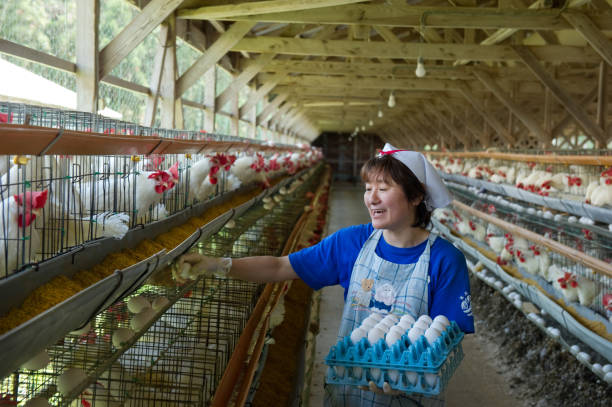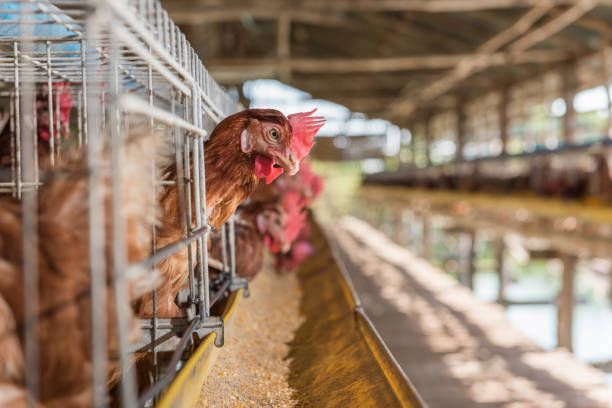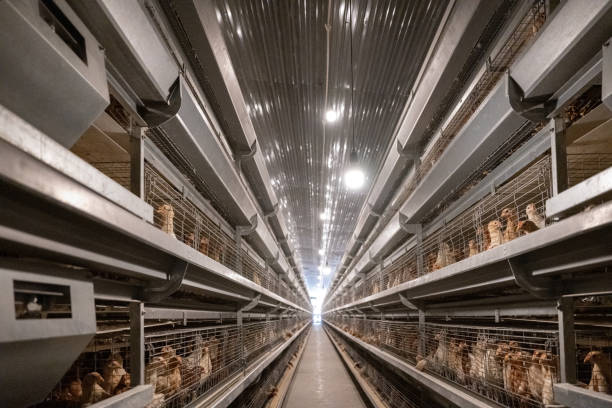Chicken Cages for Sale: Find the Perfect Setup for Your Poultry Business

For anyone venturing into the world of poultry farming, or for established farmers looking to optimize their operations, the selection of appropriate chicken cages is a pivotal decision. This isn’t just about housing; it’s about creating an environment that promotes the health, productivity, and overall well-being of your flock. In African countries, where poultry farming is a crucial contributor to food security and economic stability, choosing the right chicken cages can directly impact your profitability and the sustainability of your business. Let’s delve into the world of chicken cages, exploring the different types available, the key considerations for selection, and how the right setup can revolutionize your poultry business.
Why Chicken Cages Matter: Benefits Beyond Containment
Chicken cages aren’t merely enclosures; they’re integral components of a well-managed poultry farming system. The right cages offer a multitude of benefits:
Improved Hygiene and Disease Control: Cages, particularly those with sloped floors and manure collection systems, significantly reduce contact between the chickens and their droppings. This minimizes the risk of disease outbreaks, reduces ammonia build-up (which can cause respiratory problems), and contributes to a healthier, cleaner environment. This is particularly important in the hot and humid climates prevalent in many parts of Africa, where disease can spread rapidly.
Enhanced Egg Production Performance: For layer hens, cages offer a controlled environment that optimizes egg production. Factors like consistent lighting, temperature control, and reduced stress from predators or competition can all contribute to higher egg yields. Cages allow for individual monitoring of hens, enabling you to identify and address any issues that might be affecting their productivity.
Efficient Space Utilization: Cages allow you to house a larger number of birds in a given area compared to free-range systems. This is especially beneficial for farms with limited land availability, maximizing your output per square meter. In urban or peri-urban environments, where land is at a premium, cage systems offer a viable solution for intensive poultry farming.
Reduced Feed Waste: Cages equipped with appropriately designed feeders can minimize feed spillage and wastage. This translates to significant cost savings over time, particularly in regions where feed prices are a major expense. By controlling access to feed, you can also ensure that each bird receives adequate nutrition, further optimizing growth and egg production.
Better Management and Monitoring: Cages facilitate easier observation and management of your flock. You can readily identify and isolate sick or injured birds, administer medication, and monitor individual performance more effectively. This allows for proactive management and early intervention, preventing minor issues from escalating into major problems.
Predator Protection: In many African regions, predation by wild animals or stray dogs is a significant concern for poultry farmers. Cages provide a robust barrier against predators, protecting your flock from losses. A secure cage system gives you peace of mind and ensures the safety of your investment.
Types of Chicken Cages: Choosing the Right Fit for Your Needs
The market offers a wide variety of chicken cages, each designed for specific purposes and farming styles. Understanding the different types available is crucial for making an informed decision:
Layer Cages: These are specifically designed for egg-laying hens. They typically consist of tiered rows of cages, each housing multiple birds. Layer cages are designed to facilitate egg collection, feeding, and waste removal. Different variations exist, including A-frame cages (stackable) and H-frame cages (generally for larger operations with automated systems). When selecting layer cages, consider the bird density per cage, the ease of egg collection, the accessibility for feeding and watering, and the effectiveness of the manure management system.
Broiler Cages: Broiler cages are designed for raising meat chickens. They typically provide more floor space per bird than layer cages, allowing for adequate growth and movement. Broiler cages need to be sturdy and well-ventilated to support the rapid growth rate of broilers and prevent overheating. Factors to consider include the flooring material (wire mesh or plastic slats), the ease of cleaning, and the accessibility for harvesting the birds.
Chick Brooder Cages: These small, enclosed cages are used for raising chicks from day-old until they are old enough to be transferred to larger cages or grow-out pens. Brooder cages provide a warm, safe environment for chicks, protecting them from drafts and predators. They are typically equipped with heating lamps or pads to maintain a constant temperature. Features to look for include adjustable ventilation, easy access for feeding and watering, and a removable floor for cleaning.
Breeder Cages: These cages are designed for housing breeding pairs or small groups of chickens for reproduction purposes. They typically provide individual nesting boxes and ample space for mating. Breeder cages need to be designed to prevent injury and stress to the birds, ensuring successful breeding. Considerations include the size of the nesting boxes, the flooring material (which should be comfortable for mating), and the overall layout of the cage.

Battery Cages: Battery cages are a type of layer cage that have been widely used in the past but are now facing increasing scrutiny due to animal welfare concerns. They typically provide very limited space per bird, often restricting natural behaviors. While battery cages may offer high egg production efficiency, they are increasingly being phased out in favor of more humane cage systems.
Enriched Cages: Enriched cages are a modified version of battery cages that provide more space per bird and include features such as perches, nesting areas, and scratching pads to allow hens to express more natural behaviors. Enriched cages are seen as a more welfare-friendly alternative to battery cages, while still offering the benefits of cage systems in terms of hygiene and management.
Key Considerations When Choosing Chicken Cages
With so many options available, narrowing down the best chicken cages for your business requires careful consideration of several factors:
Bird Type and Age: The type of chicken you are raising (layers, broilers, chicks, breeders) and their age will significantly influence your cage selection. Different types of birds have different space requirements, nutritional needs, and behavioral patterns that need to be accommodated in the cage design.
Climate: The climate in your region will play a crucial role in determining the appropriate cage materials and design. In hot climates, you’ll need cages that provide adequate ventilation and shade to prevent heat stress. In cold climates, you’ll need cages that offer insulation and protection from drafts. Consider the use of galvanized steel or coated wire mesh for durability and resistance to corrosion, especially in humid coastal areas.
Farm Size and Layout: The size and layout of your farm will impact the type and number of cages you can accommodate. Consider the available space, the ease of access for feeding and cleaning, and the potential for future expansion. For smaller farms, stackable A-frame cages may be a good option to maximize space utilization. For larger farms, H-frame cages with automated systems may be more efficient.
Budget: Chicken cages range in price depending on the type, size, materials, and features. Establish a budget before you start shopping and look for cages that offer the best value for your money. Consider the long-term costs of ownership, including maintenance and replacement parts.
Local Regulations: Be aware of any local regulations or standards regarding chicken cage design and animal welfare. Some regions may have specific requirements for cage size, ventilation, and other features.
Material and Durability: Choose cages made from high-quality materials that are resistant to corrosion, rust, and wear and tear. Galvanized steel is a popular choice due to its durability and affordability. Consider the thickness of the wire mesh and the quality of the welding.

Ease of Cleaning and Maintenance: Select cages that are easy to clean and maintain. Cages with removable floors and sloped bottoms can simplify waste removal. Consider the availability of spare parts and the ease of repair.
Ventilation and Lighting: Ensure that the cages provide adequate ventilation and lighting to promote the health and well-being of your birds. Good ventilation helps to reduce ammonia build-up and prevent respiratory problems. Proper lighting is essential for egg production in layer hens.
Animal Welfare: Always prioritize the welfare of your chickens when selecting cages. Choose cages that provide adequate space, allow for natural behaviors, and minimize stress. Avoid cages that are too small or that have sharp edges or protruding wires that could injure the birds.
Livi Machinery: Your Partner in Poultry Success in Africa
At Livi Machinery, we understand the unique challenges and opportunities faced by poultry farmers in African countries. We are committed to providing high-quality, durable, and affordable chicken cages that are specifically designed to meet the needs of the African market. We offer a wide range of cage systems, including layer cages, broiler cages, chick brooder cages, and breeder cages.
Beyond providing cages, we offer:
Expert Consultation: Our experienced team can help you choose the right cage system for your specific needs and budget. We can provide advice on farm layout, ventilation, lighting, and other factors that can impact your poultry business.
Customized Solutions: We can customize our cage systems to meet your specific requirements. Whether you need a specific size, configuration, or feature, we can work with you to create a solution that fits your needs.
Installation and Training: We can provide professional installation services and training on how to properly use and maintain our cage systems.
After-Sales Support: We are committed to providing ongoing support to our customers. We offer a comprehensive warranty on our products and are available to answer any questions you may have.
Investing in the right chicken cages is an investment in the future of your poultry business. By carefully considering your needs and choosing a reputable supplier like Livi Machinery, you can create a poultry farming operation that is efficient, sustainable, and profitable. Poultry farming plays a vital role in food security and economic development in Africa, and we are proud to be a partner in your success. Contact us today to learn more about our chicken cage solutions and how we can help you achieve your poultry farming goals.






